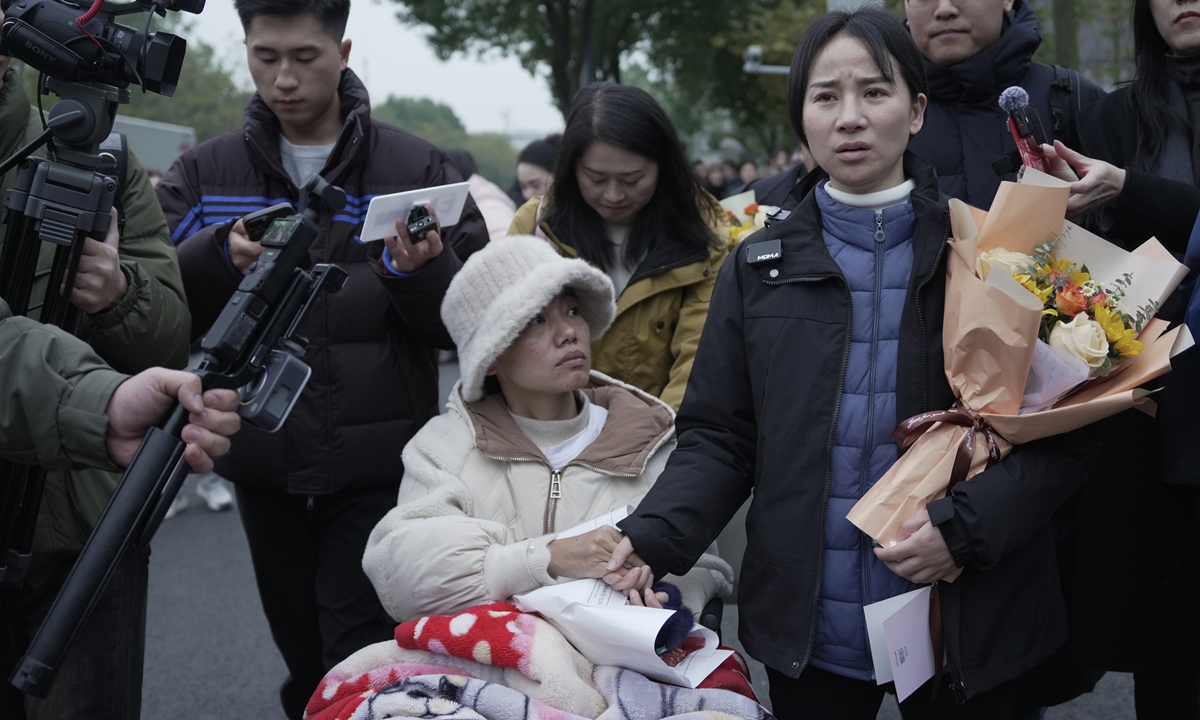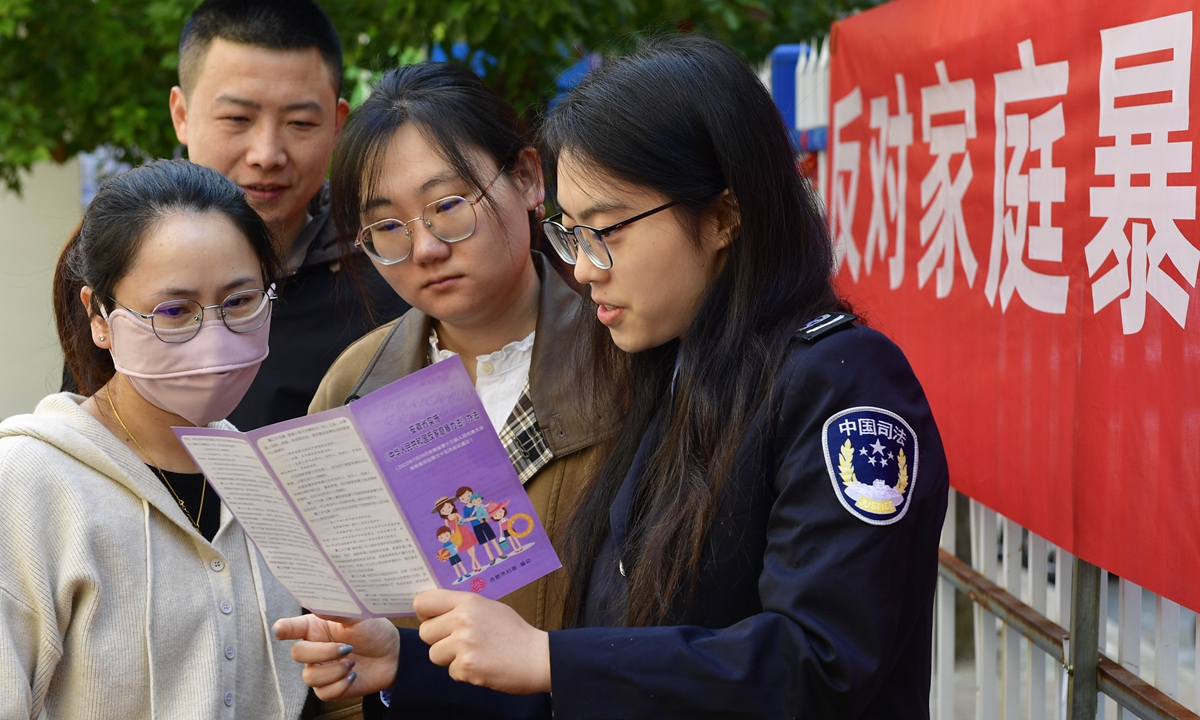IN-DEPTH / IN-DEPTH
Prominent cases showcase China’s efforts in optimizing law and intensifying social awareness to protect domestic violence victims
Zero tolerance
Editor's Note:
China's human rights stories are unfolding in a new era of comprehensive deepening reform and historic changes. It is a key component of China's poverty alleviation and whole-process people's democracy, a thorough reformation in judicial, medical insurance, and other key sectors related to the national economy and people's livelihoods, as well as a combination of numerous impressive and inspiring individual stories.
To be nurtured in youth, educated, secure gainful employment, receive medical care when ill, cared for in old age, have a place to live, and supported when weak... these are the concrete embodiments of human rights, demonstrating that the greatest human right is the right to the happiness of the people.
For a long time, politicians and media outlets in a handful of countries have remained hostile and prejudicial toward China, leading to a lack of understanding among foreign audiences when it comes to the concepts and achievements of China's human rights development. But what is revealed in the daily lives of the Chinese people speaks to the most basic truth: Rights to survival and development are fundamental human rights.
The Global Times is launching a series of articles, telling vivid stories about upholding human rights in the new era. We expect the series to become a window through which more foreign readers will understand how Chinese people recognize human rights and what efforts they have made to fight for and fully enjoy human rights in their daily lives.

After a 10-hour long trial, Xie, who had suffering 16 instances of brutal domestic violence during a marriage of two years (2021-2023), finally got divorced from her husband He Mouyang (pseudonym) and got custody of her daughter, according to Xie's post on Douyin, Chinese version of TikTok.
Seven months later, on December 27, 2024, Wuhou District People's Court sentenced He to 11 years in prison for crimes of intentional injury and abuse.
Eight years after China's first anti-domestic violence law took effect in 2016, Xie's case serves as a latest example of how more and more Chinese people suffering domestic violence are firmly employing legal weapons to protect themselves and seek justice.
About a month before the judgement on Xie's case was announced, the Supreme People's Court of China and the All-China Women's Federation jointly released five typical cases of domestic violence crimes (referring as Five Cases) on November 25, 2024, which marked the International Day for the Elimination of Violence against Women, to raise awareness of domestic violence prevention and victim protection. These cases have garnered significant attention on Chinese social media platforms.
"These cases not only prompt deep reflection among the public regarding the issue of domestic violence - a hidden crime that many people regard as merely 'family disputes,' but also showcase China's efforts over the past eight years to improve its legal system for protecting victims of domestic violence," Zhang Yonghe, a professor at the Southwest University of Political Science and Law, told the Global Times.

According to Wuhou District People's Court, He repeatedly committed acts of domestic violence, including verbal abuse and physical assault, against Xie during their marriage. Xie and He got married in May 2021.
The first instance of violence occurred just two months after they got married, and at that time, Xie was pregnant. He violently squeezed Xie's throat. The last and most severe instance of violence happened in April 2023, after He discovered that Xie was collecting evidence of his domestic violence in order to file for divorce. At that time, Xie was living in a friend's home, but He found her, knocked her unconscious, and took her to a hotel room, where he abused her for a night, Xie stated on her Douyin account.
Videos went viral on Chinese social media platforms in April, 2023, showing Xie laying on a hospital bed, with a 30-centimeter-long scar stretching from her chest to her belly and a colostomy bag attached to her body, along with other injuries. Many netizens encouraged Xie to remain brave and continue to defend herself with available legal weapons.
Yao Kefeng, chief lawyer at Beijing Guo Biao Law Firm and Xie's attorney, still remembers how shocked he was when he first met her in July, 2023. He told the Global Times that Xie's case was "one of the most shocking."
On December 25, 2024, a trial for He's criminal offenses opened at the Wuhou District People's Court. Two days later, the court announced the sentence of 11 years in prison for He for the crimes of intentional injury and abuse.
One of the Five Cases released to the public is also a typical example where the victim actively reported the crime to the police and sought help from them and the local women's federation, using legal means.
In the case, the victim, surnamed Ding, and her husband, surnamed Liang, were married for many years and had two sons together. On February 3, 2023, at around 9 pm, Liang returned home after drinking and got into an argument with Ding over trivial matters. Liang knocked Ding to the ground and kicked her in the chest and abdomen, resulting in six fractured ribs. Ding reported the incident to the police. Later, Liang turned himself in to the public security authorities and confessed to the crime.
It is hoped that this case will serve as "a demonstration, encouraging more victims to bravely say 'no' to domestic violence," read the joint announcement of the Supreme People Court and the All-China Women's Federation.
According to Zhang, despite efforts in legal education, some people still hold strong opinions advocating that "domestic violence is a family dispute" and that "domestic shame should not be publicized."
"Publicizing and generating widespread social attention on typical cases, such as Xie's case and the Five Cases, will help more people understand that domestic violence is a crime rather than a simple family issue. In the long run, this will contribute to creating a social atmosphere of zero tolerance for domestic violence," he noted.

China's anti-domestic violence law offers a legal basis for anti-domestic violence work in China, marking a milestone in the country's battle against domestic violence. Two effective weapons authorized under the law are admonition notices and personal protection orders, according to Yao.
Yao explained the different purposes of the admonition notices and personal protection orders. The former is issued by the police to warn the perpetrators that if they perpetrate violence again, they will be detained; the latter is a judicial document issued by the court, and violating it can constitute the crime of refusing to comply with a court ruling.
In one of the Five Cases, a defendant, surnamed Wang, refused to comply with a personal protection order issued to his ex-wife, continuing to assault, curse, and threaten her after divorce. Wang was sentenced to eight months' imprisonment for the crime of refusing to follow a ruling.
"This case sends a strong message to society that personal safety protection orders are not mere formalities, and that ignoring such prohibitions will lead to severe punishment," said the joint announcement.
Yao pointed out that it is important to make the issuance of admonition notices easier, and harsher punishments should be given to perpetrators.
During the two years of her marriage, Xie suffered domestic violence and reported the incidents to the police six times. In response, the police issued admonition notices to He twice.
"However, the admonition letter does not restrict the perpetrator's personal freedom, which means there is no substantial punishment for the perpetrator," Yao said. He believes that if the perpetrator is not punished, they may escalate their violence in the future.
He suggests that related departments and organizations, such as the police, the women's federation, and neighborhood committees, should establish a collaborative mechanism to ensure they inform each other when they know someone has a history of domestic violence. After an admonition notice has been issued, they should follow up with the complainant, monitor offenders, and protect victims of domestic violence who have nowhere to go.
Now, every time Xie receives private messages on her Douyin account from people who say they have also decided to seek legal support against domestic violence, she always advises them to report the incidents of domestic violence to the police as soon as they occur and to preserve evidence.
Improvements are underway. On December 6, 204, China's Ministry of Public Security, the Supreme People's Court, Ministry of Justice, and All-China Women's Federation published a set of guidelines on strengthening the implementation of the domestic violence warning system.
The guidelines outline the responsibilities of eight sectors in combating domestic violence, including courts, education authorities, civil affairs departments, hospitals and women's organizations. In particular, they highlight the implementation of a mandatory reporting system. For instance, staff at schools, kindergartens, medical institutions, community centers and social service organizations have been asked to report cases of domestic violence to the police upon discovering them, Xinhua reported.
More support available
In the guidelines released on December 6, 2024, the conditions under which police can establish the facts of domestic violence, an area that often sparks controversy in real-life situations, are further clarified.
The guidelines also list eight types of supplementary evidence, including digital materials such as audio-visual recordings and telephone recordings documenting the domestic violence incident. These eight types of supplementary evidence aim to provide clearer operational standards for the police when issuing admonition notices. For the general public, it is now more explicit what evidence needs to be collected in order to request the issuance of a warning letter.
More measures are also accessible for domestic violence victims to receive timely and effective support.
According to a report on national efforts to combat domestic violence presented at the fifth session of the Standing Committee of the 14th National People's Congress (NPC) on August 28, 2023, the China's Ministry of Civil Affairs is collaborating with over 1,500 civil affairs rescue management institutions to offer temporary shelter and assistance services for victims whose personal safety is at risk due to domestic violence, homelessness, or other temporary living challenges. These services encompass food and accommodation, placement assistance, legal aid, psychological counseling, mediation for marriage and family disputes, and support in applying for personal safety protection orders.
Legal aid agencies nationwide have established more than 4,700 legal aid workstations in partnership with women's federations and youth league organizations, along with over 260,000 legal aid contact points based in village and community committees. This network enables victims of domestic violence to access legal aid services quickly and conveniently. In 2022, national legal aid agencies addressed over 8,900 cases related to abuse, abandonment, and domestic violence, providing legal consultations to more than 2.06 million women and children, according to the report.
As a whole, the proportion of women who have experienced physical and psychological violence from their spouse during marriage was 8.6 percent in 2021 in China, a decrease of 5.2 percentage points compared to 2010, read the report.
Anti-domestic violence has become a consensus across China. Domestic violence is a crime, and the victims of domestic violence suffer tragically. Ending domestic violence is a dual rescue for individuals and families, as well as a fundamental obligation to safeguard human rights, according to Zhang.
"The level of civilization in a society is primarily measured by its attitude toward the weak and whether the weak in that society are protected. Although the path to ending domestic violence is difficult and winding, any country that bears the welfare of its people will not reject the demand to protect the weak, nor will it overlook the compassion that exists outside the law for the vulnerable," Zhang stressed.

China's human rights stories are unfolding in a new era of comprehensive deepening reform and historic changes. It is a key component of China's poverty alleviation and whole-process people's democracy, a thorough reformation in judicial, medical insurance, and other key sectors related to the national economy and people's livelihoods, as well as a combination of numerous impressive and inspiring individual stories.
To be nurtured in youth, educated, secure gainful employment, receive medical care when ill, cared for in old age, have a place to live, and supported when weak... these are the concrete embodiments of human rights, demonstrating that the greatest human right is the right to the happiness of the people.
For a long time, politicians and media outlets in a handful of countries have remained hostile and prejudicial toward China, leading to a lack of understanding among foreign audiences when it comes to the concepts and achievements of China's human rights development. But what is revealed in the daily lives of the Chinese people speaks to the most basic truth: Rights to survival and development are fundamental human rights.
The Global Times is launching a series of articles, telling vivid stories about upholding human rights in the new era. We expect the series to become a window through which more foreign readers will understand how Chinese people recognize human rights and what efforts they have made to fight for and fully enjoy human rights in their daily lives.

Photo: VCG
"Finally, I am free!" Stepping out of the Wuhou District People's Court in Chengdu, Southwest China's Sichuan Province on May 31, 2024, Xie Moumei (pseudonym), 30, cannot help but cry.After a 10-hour long trial, Xie, who had suffering 16 instances of brutal domestic violence during a marriage of two years (2021-2023), finally got divorced from her husband He Mouyang (pseudonym) and got custody of her daughter, according to Xie's post on Douyin, Chinese version of TikTok.
Seven months later, on December 27, 2024, Wuhou District People's Court sentenced He to 11 years in prison for crimes of intentional injury and abuse.
Eight years after China's first anti-domestic violence law took effect in 2016, Xie's case serves as a latest example of how more and more Chinese people suffering domestic violence are firmly employing legal weapons to protect themselves and seek justice.
About a month before the judgement on Xie's case was announced, the Supreme People's Court of China and the All-China Women's Federation jointly released five typical cases of domestic violence crimes (referring as Five Cases) on November 25, 2024, which marked the International Day for the Elimination of Violence against Women, to raise awareness of domestic violence prevention and victim protection. These cases have garnered significant attention on Chinese social media platforms.
"These cases not only prompt deep reflection among the public regarding the issue of domestic violence - a hidden crime that many people regard as merely 'family disputes,' but also showcase China's efforts over the past eight years to improve its legal system for protecting victims of domestic violence," Zhang Yonghe, a professor at the Southwest University of Political Science and Law, told the Global Times.

Xie, accompanied by a friend, enters a court in a wheelchair in Chengdu, Sichuan Province, on December 27, 2024. Photo: VCG
Raising public awarenessAccording to Wuhou District People's Court, He repeatedly committed acts of domestic violence, including verbal abuse and physical assault, against Xie during their marriage. Xie and He got married in May 2021.
The first instance of violence occurred just two months after they got married, and at that time, Xie was pregnant. He violently squeezed Xie's throat. The last and most severe instance of violence happened in April 2023, after He discovered that Xie was collecting evidence of his domestic violence in order to file for divorce. At that time, Xie was living in a friend's home, but He found her, knocked her unconscious, and took her to a hotel room, where he abused her for a night, Xie stated on her Douyin account.
Videos went viral on Chinese social media platforms in April, 2023, showing Xie laying on a hospital bed, with a 30-centimeter-long scar stretching from her chest to her belly and a colostomy bag attached to her body, along with other injuries. Many netizens encouraged Xie to remain brave and continue to defend herself with available legal weapons.
Yao Kefeng, chief lawyer at Beijing Guo Biao Law Firm and Xie's attorney, still remembers how shocked he was when he first met her in July, 2023. He told the Global Times that Xie's case was "one of the most shocking."
On December 25, 2024, a trial for He's criminal offenses opened at the Wuhou District People's Court. Two days later, the court announced the sentence of 11 years in prison for He for the crimes of intentional injury and abuse.
One of the Five Cases released to the public is also a typical example where the victim actively reported the crime to the police and sought help from them and the local women's federation, using legal means.
In the case, the victim, surnamed Ding, and her husband, surnamed Liang, were married for many years and had two sons together. On February 3, 2023, at around 9 pm, Liang returned home after drinking and got into an argument with Ding over trivial matters. Liang knocked Ding to the ground and kicked her in the chest and abdomen, resulting in six fractured ribs. Ding reported the incident to the police. Later, Liang turned himself in to the public security authorities and confessed to the crime.
It is hoped that this case will serve as "a demonstration, encouraging more victims to bravely say 'no' to domestic violence," read the joint announcement of the Supreme People Court and the All-China Women's Federation.
According to Zhang, despite efforts in legal education, some people still hold strong opinions advocating that "domestic violence is a family dispute" and that "domestic shame should not be publicized."
"Publicizing and generating widespread social attention on typical cases, such as Xie's case and the Five Cases, will help more people understand that domestic violence is a crime rather than a simple family issue. In the long run, this will contribute to creating a social atmosphere of zero tolerance for domestic violence," he noted.

Judicial staff conduct an anti-domestic violence campaign among residents in Hefei, East China's Anhui Province, on November 21, 2024. Photo: VCG
Strengthening protections for victimsChina's anti-domestic violence law offers a legal basis for anti-domestic violence work in China, marking a milestone in the country's battle against domestic violence. Two effective weapons authorized under the law are admonition notices and personal protection orders, according to Yao.
Yao explained the different purposes of the admonition notices and personal protection orders. The former is issued by the police to warn the perpetrators that if they perpetrate violence again, they will be detained; the latter is a judicial document issued by the court, and violating it can constitute the crime of refusing to comply with a court ruling.
In one of the Five Cases, a defendant, surnamed Wang, refused to comply with a personal protection order issued to his ex-wife, continuing to assault, curse, and threaten her after divorce. Wang was sentenced to eight months' imprisonment for the crime of refusing to follow a ruling.
"This case sends a strong message to society that personal safety protection orders are not mere formalities, and that ignoring such prohibitions will lead to severe punishment," said the joint announcement.
Yao pointed out that it is important to make the issuance of admonition notices easier, and harsher punishments should be given to perpetrators.
During the two years of her marriage, Xie suffered domestic violence and reported the incidents to the police six times. In response, the police issued admonition notices to He twice.
"However, the admonition letter does not restrict the perpetrator's personal freedom, which means there is no substantial punishment for the perpetrator," Yao said. He believes that if the perpetrator is not punished, they may escalate their violence in the future.
He suggests that related departments and organizations, such as the police, the women's federation, and neighborhood committees, should establish a collaborative mechanism to ensure they inform each other when they know someone has a history of domestic violence. After an admonition notice has been issued, they should follow up with the complainant, monitor offenders, and protect victims of domestic violence who have nowhere to go.
Now, every time Xie receives private messages on her Douyin account from people who say they have also decided to seek legal support against domestic violence, she always advises them to report the incidents of domestic violence to the police as soon as they occur and to preserve evidence.
Improvements are underway. On December 6, 204, China's Ministry of Public Security, the Supreme People's Court, Ministry of Justice, and All-China Women's Federation published a set of guidelines on strengthening the implementation of the domestic violence warning system.
The guidelines outline the responsibilities of eight sectors in combating domestic violence, including courts, education authorities, civil affairs departments, hospitals and women's organizations. In particular, they highlight the implementation of a mandatory reporting system. For instance, staff at schools, kindergartens, medical institutions, community centers and social service organizations have been asked to report cases of domestic violence to the police upon discovering them, Xinhua reported.
More support available
In the guidelines released on December 6, 2024, the conditions under which police can establish the facts of domestic violence, an area that often sparks controversy in real-life situations, are further clarified.
The guidelines also list eight types of supplementary evidence, including digital materials such as audio-visual recordings and telephone recordings documenting the domestic violence incident. These eight types of supplementary evidence aim to provide clearer operational standards for the police when issuing admonition notices. For the general public, it is now more explicit what evidence needs to be collected in order to request the issuance of a warning letter.
More measures are also accessible for domestic violence victims to receive timely and effective support.
According to a report on national efforts to combat domestic violence presented at the fifth session of the Standing Committee of the 14th National People's Congress (NPC) on August 28, 2023, the China's Ministry of Civil Affairs is collaborating with over 1,500 civil affairs rescue management institutions to offer temporary shelter and assistance services for victims whose personal safety is at risk due to domestic violence, homelessness, or other temporary living challenges. These services encompass food and accommodation, placement assistance, legal aid, psychological counseling, mediation for marriage and family disputes, and support in applying for personal safety protection orders.
Legal aid agencies nationwide have established more than 4,700 legal aid workstations in partnership with women's federations and youth league organizations, along with over 260,000 legal aid contact points based in village and community committees. This network enables victims of domestic violence to access legal aid services quickly and conveniently. In 2022, national legal aid agencies addressed over 8,900 cases related to abuse, abandonment, and domestic violence, providing legal consultations to more than 2.06 million women and children, according to the report.
As a whole, the proportion of women who have experienced physical and psychological violence from their spouse during marriage was 8.6 percent in 2021 in China, a decrease of 5.2 percentage points compared to 2010, read the report.
Anti-domestic violence has become a consensus across China. Domestic violence is a crime, and the victims of domestic violence suffer tragically. Ending domestic violence is a dual rescue for individuals and families, as well as a fundamental obligation to safeguard human rights, according to Zhang.
"The level of civilization in a society is primarily measured by its attitude toward the weak and whether the weak in that society are protected. Although the path to ending domestic violence is difficult and winding, any country that bears the welfare of its people will not reject the demand to protect the weak, nor will it overlook the compassion that exists outside the law for the vulnerable," Zhang stressed.


